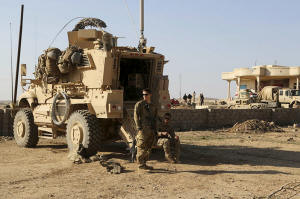Regime change in Syria has Iraqi factions backtracking on push for US
withdrawal
 Send a link to a friend
Send a link to a friend
 [February 01, 2025]
By QASSIM ABDUL-ZAHRA and ABBY SEWELL [February 01, 2025]
By QASSIM ABDUL-ZAHRA and ABBY SEWELL
BAGHDAD (AP) — The fall of Bashar Assad in Syria has led Iran-allied
factions in neighboring Iraq to reconsider their push for U.S. forces to
exit the country, multiple Iraqi and American officials told The
Associated Press.
The U.S. and Iraq announced an agreement last year to wind down the
military mission in Iraq of an American-led coalition fighting the
Islamic State group by September 2025, with U.S. forces departing some
bases where they have stationed troops during a two-decade-long military
presence in the country.
Political and armed factions linked to Iran had been among the loudest
voices calling for a U.S. exit from Iraq — particularly after the Oct.
7, 2023 Hamas attack in southern Israel and Israel’s ensuing bombardment
and ground invasion of Gaza.
In Iraq, as in much of the Arab world, U.S. backing for Israel in a war
that killed tens of thousands of civilians and displaced nearly Gaza’s
entire population of 2.3 million was unpopular.

When the agreement was reached to end the coalition's mission in Iraq,
Iraqi political leaders said the threat of IS was under control and they
no longer needed Washington’s help to beat back the remaining cells.
But the fall of Assad in a lightning offensive led by Sunni Islamist
rebels in December led some to reassess that stance, including members
of the Coordination Framework, a coalition of mainly Shiite, Iran-allied
political parties that brought current Iraqi Prime Minister Mohammad
Shia al-Sudani to power in late 2022.
The fall of Assad — an ally of Iran — weakened Tehran's hand in the
region, leaving allied groups in Iraq feeling vulnerable. Many in Iraq
also fear that IS could take advantage of the security vacuum to stage a
comeback while Syria's new leaders are still consolidating their control
over the country and forming a national army.
“Most leaders of the Shiite Coordination Framework are in favor of
keeping American forces in Iraq and will not want American forces to
leave Iraq as a result of what happened in Syria,” said one official
with the group. “They are afraid of ISIS exploiting the vacuum if the
Americans leave Iraq and the situation in Iraq collapses.”
Multiple other Iraqi political and security officials gave similar
assessments. They spoke on condition of anonymity because they were not
authorized to comment publicly.
A high-ranking official in Iraq’s National Security Service said that in
a meeting with the Iraqi government, his agency had made the argument
that “it is not in Iraq’s interest to request the withdrawal of the US
and the international coalition from Iraq at the present time.”
“The loud voices that were previously talking about the withdrawal of
U.S. forces from Iraq have decreased significantly,” he said. “I expect
that there will be no withdrawal this year by the Americans.”
A senior U.S. defense official, who also spoke on condition of anonymity
because he was not authorized to comment publicly, said that since the
fall of Assad in Syria, Iraqi government officials have asked
“informally at the highest of levels” to delay the end of the mission in
Iraq of an American-led coalition fighting the Islamic State group and
the withdrawal of U.S. forces from Iraq.
[to top of second column]
|

U.S. Army soldiers stand outside their armored vehicle on a joint
base with the Iraqi army, south of Mosul, Iraq, Feb. 23, 2017. (AP
Photo/ Khalid Mohammed, File)

He said the Iraqis were anxious that IS could take advantage of the
chaos following Assad’s ouster — and of large stockpiles of weapons
abandoned by the former Syrian army — to stage a comeback, which he
described as a “valid concern.”
“ISIS is not imminently going to make a resurgence, but it certainly
could,” he said, using an alternative name for IS.
The Iraqi government has not made any public statement about the
possibility of extending the coalition’s mandate. Iraqi government
spokesperson Bassim al-Awadi said Friday that the “time frames
between Iraq and the international coalition have not changed” and
that meetings between Iraq and coalition officials are ongoing.
While Iraqi would likely need to make a formal written request to
extend the withdrawal timeline, al-Sudani might be reluctant to make
the request publicly out of fear of being portrayed by domestic
rivals as backing down after he had previously called for a U.S.
exit. The Iraqi government has attempted to maintain a delicate
balance between its ties to Iran and to the United States.
Iraqi armed groups have also had a complicated relationship with
U.S. forces, with the same groups sometimes attacking them and on
other occasions becoming allies of convenience in a fight against a
common enemy.
The Popular Mobilization Forces, a coalition of primarily Shiite,
Iran-backed armed groups, fought against the Islamic State group
beginning in 2014, when IS militants rampaged across the country,
seizing large swathes of territory.
Renad Mansour, a senior research fellow at the Chatham House think
tank in London, said that while there wasn't “active coordination”
between the U.S. forces and PMF at the time “they were fighting the
same war on the same side against the same enemy.”

During the war in Gaza, some of the groups that make up the PMF
launched drone attacks on U.S. bases in Iraq and Syria. They have
not launched any attacks since the fall of Assad.
Mansour said that much of the anxiety in Iraq about the post-Assad
future of Syria stems from Iraq’s own history. Many of the country's
current leaders remember the chaotic years following the fall of
Iraq’s former strongman leader, Saddam Hussein, in a U.S.-led
invasion in 2003.
“If the argument for removing the U.S. troops from Iraq was that the
fight against ISIS was over and the region is stable, that
calculation has changed following regime change in Syria,” he said.
“The threat of Daesh (the Arabic acronym for IS) in the context of
an unstable and precarious Syria for the next few years is very real
for the Coordination Framework and the government in Iraq.”
————-
Sewell reported from Beirut.
All contents © copyright 2025 Associated Press. All rights reserved |